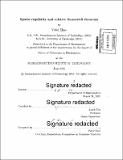Sparse regularity and relative Szemerédi theorems
Author(s)
Zhao, Yufei
DownloadFull printable version (10.08Mb)
Other Contributors
Massachusetts Institute of Technology. Department of Mathematics.
Advisor
Jacob Fox.
Terms of use
Metadata
Show full item recordAbstract
We extend various fundamental combinatorial theorems and techniques from the dense setting to the sparse setting. First, we consider Szemerédi regularity lemma, a fundamental tool in extremal combinatorics. The regularity method, in its original form, is effective only for dense graphs. It has been a long standing problem to extend the regularity method to sparse graphs. We solve this problem by proving a so-called "counting lemma," thereby allowing us to apply the regularity method to relatively dense subgraphs of sparse pseudorandom graphs. Next, by extending these ideas to hypergraphs, we obtain a simplification and extension of the key technical ingredient in the proof of the celebrated Green-Tao theorem, which states that there are arbitrarily long arithmetic progressions in the primes. The key step, known as a relative Szemerédi theorem, says that any positive proportion subset of a pseudorandom set of integers contains long arithmetic progressions. We give a simple proof of a strengthening of the relative Szemerédi theorem, showing that a much weaker pseudorandomness condition is sufficient. Finally, we give a short simple proof of a multidimensional Szemerédi theorem in the primes, which states that any positive proportion subset of Pd (where P denotes the primes) contains constellations of any given shape. This has been conjectured by Tao and recently proved by Cook, Magyar, and Titichetrakun and independently by Tao and Ziegler.
Description
Thesis: Ph. D., Massachusetts Institute of Technology, Department of Mathematics, 2015. Cataloged from PDF version of thesis. Includes bibliographical references (pages 171-179).
Date issued
2015Department
Massachusetts Institute of Technology. Department of MathematicsPublisher
Massachusetts Institute of Technology
Keywords
Mathematics.